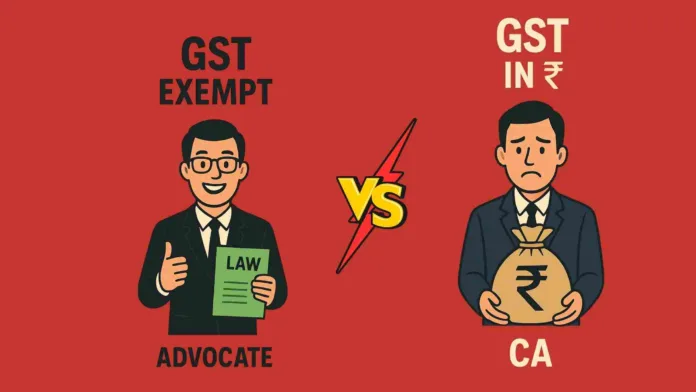A fresh debate on “fairness” in India’s GST regime is bubbling up: if individual lawyers (including tax lawyers) don’t typically charge GST, should Chartered Accountants (CAs) and other tax professionals get the same relief?
The short answer is more nuanced than the viral claim “GST is exempt for individual lawyers.” Under GST, legal services are largely taxed under reverse charge when supplied to business entities—so the recipient (the business client) pays the GST, not the advocate or law firm. And when legal services are provided to non-business recipients(individuals) or to very small businesses under the registration threshold, they’re exempt. The net effect: many advocates neither charge GST nor register purely for such supplies, while the tax still lands where the law intends.
What the law actually says (as of Aug 22, 2025)
Legal services definition & charge mechanism: In 2017, the government clarified there was “no change” from the service-tax era—legal services from advocates remain under Reverse Charge Mechanism (RCM) when supplied to business entities. That means the business entity pays GST, not the advocate.
Exemptions: Legal services provided by (a) an advocate or firm to any person other than a business entity, or (b) to a small business below the GST registration threshold, are exempt under Notification 12/2017-CT(R)(Entry 45). In practice, that covers most B2C legal work.
RCM notification base: RCM for legal services is notified under Section 9(3) via Notification 13/2017 (and corresponding IGST notification), specifically listing advocates/law firms with business entities as the person liable to pay tax.
By contrast, CA and tax-consultancy services are on forward charge: the supplier (CA/firm) charges GST to the client and remits it. These services fall under SAC 9982/99823 (legal & accounting; tax consultancy) and, in general, are taxed at 18% under Notification 11/2017-CT(R) and related entries referenced in rulings.
Also common to all service providers (including advocates and CAs): mandatory GST registration kicks in at ₹20 lakh aggregate annual turnover in most states (₹10 lakh in special category states), unless a specific exception applies.
So, is the system “unfair”?
The case for parity (what CAs argue)
Compliance burden asymmetry: Advocates serving businesses do not handle GST on those bills (RCM shifts it to the recipient). CAs must register, charge, invoice, collect, and remit—raising compliance costs for small practices.
B2C treatment gap: An individual hiring a lawyer for a personal matter typically faces no GST (exempt). The same individual hiring a CA for personal tax planning does bear GST (if the CA is registered), making CA services visibly costlier in B2C contexts.
Cash-flow neutrality for businesses: In B2B work, putting CAs under RCM (like advocates) would likely be ITC-neutral for GST-registered recipients, while reducing small-firm compliance load. This parity view periodically surfaces alongside broader asks such as raising registration thresholds for services.
The case for the status quo (what the government has signaled)
Continuity with pre-GST policy: The Centre explicitly said in 2017 that the legal-services construct did not change in GST from service tax days—suggesting a deliberate policy choice to retain RCM/exemptions for access-to-justice and administrative reasons.
Targeted relief vs. blanket parity: Exempting B2C legal services and pushing B2B to RCM was designed as a narrow carve-out. Extending the same to all professional services could widen exemptions/RCM beyond the original policy scope and create revenue and control challenges (tracking, verification, anti-evasion). That risk calculus—rightly or wrongly—likely explains why CAs remain on forward charge.
Who wins and who loses today
Individuals: Pay no GST on personal legal services; often pay 18% GST on personal tax/advisory services from registered CAs. That’s the most visible fairness gap for consumers.
Small businesses below threshold: Legal services are exempt; CA services become taxable only if the CA is registered (many are), so cost rises for the smallest enterprises that still need compliance help.
Registered businesses: Either way they generally claim ITC, so tax is neutral. But RCM on legal services shifts compliance to the recipient, while forward charge on CA services keeps compliance with the supplier.
What policy options are on the table?
- Extend RCM to specified professional services (e.g., tax/accounting): This would align CAs with advocates for B2B supplies. Pros: parity; reduced compliance for small CA firms; mostly ITC-neutral for registered recipients. Cons: expands RCM scope; increases recipient-side compliance; monitoring challenges.
- B2C exemption for tax/accounting up to a cap: Mirror the legal-services B2C relief by exempting personal tax filing/planning services up to a reasonable fee or income cap. Pros: consumer fairness; encourages compliance. Cons: revenue hit; boundary disputes (what’s “personal” vs “business”?).
- Raise the services registration threshold (sector-neutral): Industry groups have recently asked to consider ₹50 lakh for services to cut compliance costs across the board. Pros: helps all small professionals, not just CAs. Cons: reduces taxpayer base; political call for the GST Council.
Where things stand
There is no official move yet to put CA/tax-consultancy services under RCM or to exempt them on the B2C side. As of today, legal services continue under the RCM + targeted exemption model; CA and other professional services remain forward charge at 18%, with the standard ₹20-lakh registration threshold for services. Any shift would require GST Council recommendations and fresh notifications under Sections 9(3) and 11 of the CGST Act.
If the policy goal is symmetry, the cleanest fixes are either RCM parity for professional services (B2B) or a narrow B2C exemption for personal tax/accounting work—paired with robust anti-abuse rules. Until the GST Council bites, though, lawyers and CAs will continue to live under different GST rules by design, not by accident.
Read More: Anupam Mittal Slams Real-Money Gaming Ban, Says India Lost Rs. 27,000 Cr GST Revenue

